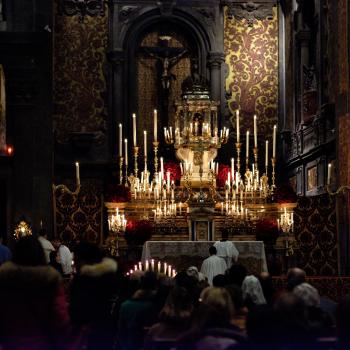Connor Wood
A recent Alternet piece stirred up a storm by posing the question, “Is atheism an intellectual luxury for the wealthy?” The author, Chris Arnade, is a former Wall Street high roller who now works with the homeless in the Bronx. In his new job, he was surprised to find that the disadvantaged and destitute were far more devout than the educated folks he’d spent most of his life associating with. This realization inspired Arnade to wonder whether faith was something only the successful could afford to abandon. Ongoing research suggests that from a systemic perspective, there may be something to this – but not necessarily in the way Arnade describes.
Let me state my argument directly, because it’s not likely to be one most readers will agree with prima facie: namely, there’s good evidence that atheism and secularism are much more costly, in terms of sheer energy expenditure, than religious ways of organizing society. As I said, this may not make immediate sense; what about all the time that religious people spend on seemingly useless activities, like rituals, church, and prayers? From a secular perspective, these pursuits don’t exactly look like the most energy-efficient ways to spend one’s time. (Indeed, Bill Gates once said he wasn’t religious because there were more productive things to do with his Sunday mornings than sit in a church.)
But the burgeoning field of the evolutionary study of religion suggests that there may be sense behind all this apparent waste of effort.
Imagine you’re a biologist studying any other species. If you observe certain behaviors over and over again, you’ll probably conclude that there’s some practical reason for them – even if they seem absurd or pointless. Evolution is, after all, relatively parsimonious. Truly wasteful or destructive behaviors tend to get bred out of any natural population pretty quickly.
Take the rutting behavior of elk. During breeding season, male elk (bulls) do a very strange thing. Rather than directly wooing the actual females (who, after all, are the ones they’re hoping to mate with) the males turn their attention toward each other. In a show of aggression, the bulls charge at each other and lock antlers, pushing each other and grunting in a battle that’s part fencing, part wrestling, and very earnest indeed. These fights, called “sparring,” are typically between dominant bulls and challengers. They occasionally result in death of one of the animals, but usually the loser simply admits defeat and runs away. The victor then proceeds to mate with the herd’s cows.
This odd behavior is seen in elk all around the world, every single year. It has been this way for millennia. Sparring is clearly rooted in the basic genetics of the elk species. But from a purely utilitarian standpoint, it’s also clearly wasteful. Bulls lose a ton of energy during sparring. They often get injured. Wouldn’t it be easier and quicker just to walk up to the cows and try to woo them directly? That way the cows themselves could choose which bulls to mate with, and this would simplify the whole rutting process.
If you agree, congratulations. You’re smarter than nature.
No, I’m kidding. Nature’s smarter than you. In reality, sparring between elk bulls is the most efficient way for cows to determine which bulls to mate with. This is because sparring is a ritual that conveys a roughly honest signal of quality; bulls with exceptional stamina and strength nearly always win sparring matches, and so cows are well-advised to choose the winners of sparring contests as mates.
The sparring ritual seems wasteful, but it’s actually much more efficient than if each bull tried to demonstrate his desirability to each cow. The yearly elk rut is, then, a perfect example of a phenomenon I’ve written about elsewhere on this blog: basic ritual helps to streamline and condense valuable social information, making events and relationships unambiguously clear for observers and participants alike.
Can the same logic be applied to the seemingly wasteful rituals or beliefs of traditional religious cultures? The answer is yes (although they don’t all have to do with rutting).
Anthropologist Rich Sosis of the University of Connecticut has shown that religious communities that require more ritual sacrifices from their members – such as doing daily Bible study or avoiding certain tasty foods – tend to survive longer. This is because costly rituals set up an investment barrier to membership in a religious community. If a religious community requires members to participate in lots of time-consuming rituals, then the people who don’t really want to be there will opt out, leaving behind only those who are really and truly committed. (I’ve written previously on this effect, here.) This means that partaking in a difficult or time-consuming ritual, like showing up every Sunday for church rain or shine, is an honest signal of one’s motivation to be in the group.
In contrast, more verbal, logical, and reason-based communication – something secular and cosmopolitan society valorizes – offers few good ways to honestly signal your commitment to a community. You can say you’re a committed member of so-and-so church or group, but this costs nothing to do. There’s no investment barrier. On the basis of words alone, therefore, it’s very difficult and energy-consuming for members of a community to figure out who’s actually committed and who isn’t.
Talk isn’t cheap, in other words – it’s expensive.
So ritual – an embodied style of communication that demands effortful physical displays and intuitive thinking – is often the most efficient means of showing who’s truly reliable and trustworthy. Thus, communities that shun ritual and rely on verbal, straightforward communication (such as the modern secular West) have to expend a ton of energy for everyone to understand what roles they’re supposed to play – and to ensure they actually carry out the responsibilities those roles entail.
If you’ve ever hung out in radical housing co-ops in the U.S. or Europe, you’ll know what I’m talking about. These communities tend to be highly liberal, very well-educated, and low in religious adherence or traditional social values. There’s usually a ton of interpersonal negotiation, with members sitting around in kitchens patiently (and sometimes tensely) using explicit, direct, verbal communication to hash out disagreements and responsibilities. People talk about their feelings abundantly, sometimes for hours. The sheer business of communication can take up an awesome amount of co-op residents’ time and energy.
In this sense, residents of cooperative housing form a representative subsample of today’s Western culture. Increasingly secular and suspicious of traditional mores, Europeans and North Americans rely more and more on explicit, analytical communication and less on rituals to express their relationships and obligations to one another. It’s not uncommon, for instance, to hear serious commentators suggest that marriage – a ritual that makes crystal clear two people’s roles and and obligations to one another vis-à-vis a community – may be an obsolete concept. And questions of religion’s value are so commonplace that calling religion a misguided waste of time is a cottage industry.
And so here’s the thing: the reason we’re increasingly rejecting ritual and seemingly absurd religious beliefs is because we can afford to. The beneficiaries of a massive world economic system, we have the ample time, energy, and resources to spend on negotiating and re-negotiating our relationships, day in and day out. For the most part, we don’t have to spend our time planting, harvesting, herding animals, or doing eight hours of laundry a day. We’re free to redirect our energy into making social relationships explicit – which entails using analytical, logical, “system 2”-style processing to crunch an enormous amount of social data consciously.
Ritual, on the other hand, uses intuitive, holistic, “system 1”-style processing to establish and solidify social roles not by talking about them, but by demonstrating them. A wedding, for example, isn’t a symbol of two people getting married. It isn’t a discursive negotiation of their relationship. A wedding is two people getting married – the act is the same thing as the concept. In the same way, a bull elk that’s lost a ritualized sparring contest doesn’t negotiate his subordinate status with the victor by walking away. He demonstrates it.
To briefly talk semiotics, ritual keeps the signifier and the signified – the thing doing the communicating and the thing that’s being communicated – much, much closer to each other than analytical, verbal communication does. The extra distance between the signifier and signified means that verbal communication is always going to be more costly, in terms of energy input, than ritualized communication. This is even true in the physical brain, where explicit, analytical cognition – which fuels verbal discourse – uses up significantly more energy (in the form of glucose) than the intuitive cognition that powers ritualized interactions.
So is atheism a luxury of the wealthy? Yes. But this isn’t simply because the wealthy don’t need the comforts of a posited afterlife. It’s also because materially comfortable people have more energy to expend on negotiating their social worlds. Ritual and religion use intuition and demonstration; they prioritize efficiency and clarity of signals. Secularism uses logic and abstract reason; it’s comfortable with ambiguous social roles and signals. In part, this is because it can afford to be.












